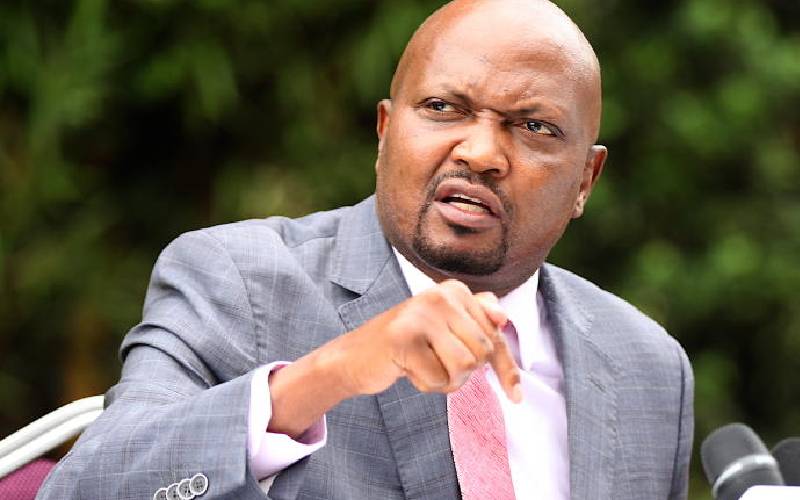At least 22 Kenyan youth reveal they were conned into working for two months without pay under companies linked to former Cabinet Secretary and Presidential Advisor Moses Kuria.
The victims, who were recruited through advertisements tied to Adams Capital, say they were tasked with running digital campaigns for 15 brands belonging to Kuria’s business empire.
Beginning on July 26, the team was deployed to a godown off the Kamakis bypass at a site called Westport, where they worked daily – including weekends – producing social media content and strategy. One of the workers was appointed to train the rest, under the supervision of a lead team that included a woman named Iryn and two men referred to as Atom and Josh.
The workers say they were promised formal contracts after three weeks. That never happened.
After two months of work, they were relocated to a new office at Wespark Business Center in Westlands, Nairobi. Meetings were held with Kuria himself, but shortly after deadlines were met and deliverables submitted, communication was cut off. The team was removed from internal communication groups and never paid a cent.
They now accuse Moses Kuria of running a long con designed to exploit skilled youth desperate for work, while hiding behind his vast web of companies. One whistleblower claims they spent an average of KSh 450 daily commuting to Kamakis and KSh 350 to Westlands – excluding meals – just to show up and perform the job.
“We have bills to settle, rents to pay, and children to feed. Some of us are now in depression and facing eviction,” the whistleblower said.
The affected team says Kuria and his handlers are already recruiting a new batch of unsuspecting workers, continuing the same exploitative cycle.
Not the First Time
This is not the first time Moses Kuria has been accused of shady labor practices or financial misconduct. In 2019, several of his companies – including Fanaka TV and Emerging Capital Holdings – shut down while owing months of unpaid salaries to staff and vendors.
As Trade Cabinet Secretary, Kuria was also tied to multiple procurement scandals. These include a KSh 12.2 billion sugar importation deal with shadowy firm Invest Africa FZE, and the awarding of suspicious edible oil tenders. He appointed associates with ongoing graft cases to key oversight roles, including at the Kenya Bureau of Standards.
Multiple media exposés have revealed that companies tied to Kuria won public tenders – including for stadium construction – despite having no relevant experience. One such firm, Emerging Capital Holdings, was co-owned by his brother.

CONMAN OF EPIC PROPORTIONS AND THIEF BEYOND MEASURE: Moses Kuria was paid to construct stadiums despite no technical skills or capacity for the same
Now, whistleblowers say Kuria is continuing the same model through newer entities like Chennai Technologies, Execuget, Tamair, Shehena, Maisha Top, and AMAC – each involved in suspect deals ranging from fake alcohol supply contracts to fleecing farmers and investors.
The Digital Sweatshop Model
The emerging picture is of a digital sweatshop model dressed up as corporate innovation. Recruit a skilled young team. Delay contracts. Demand output. Then vanish.
Conclusion
While Kuria positions himself as a pro-business maverick, the testimonies piling up tell a story of impunity, wage theft, and exploitation wrapped in corporate branding. The silence from authorities only fuels suspicion that what’s happening is state-protected fraud.
The 22 whistleblowers have broken that silence.
And if their claims hold, this isn’t just a story about unpaid wages – it’s a pattern of corruption that runs from a Kamakis godown to the heart of government.

